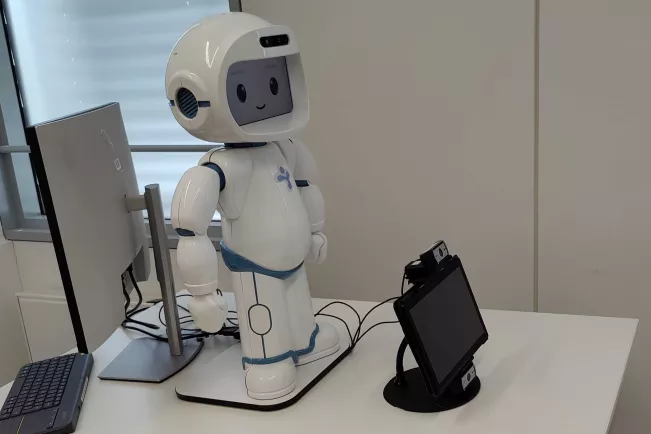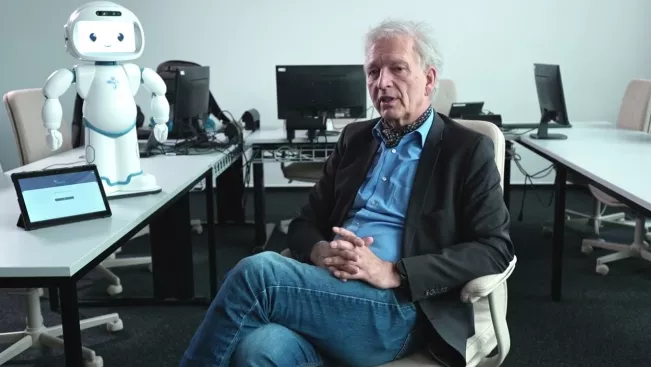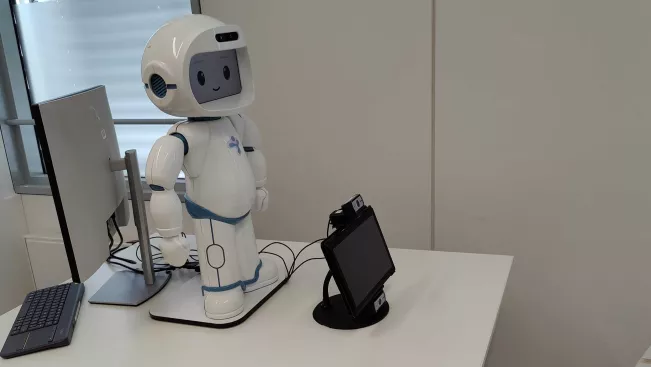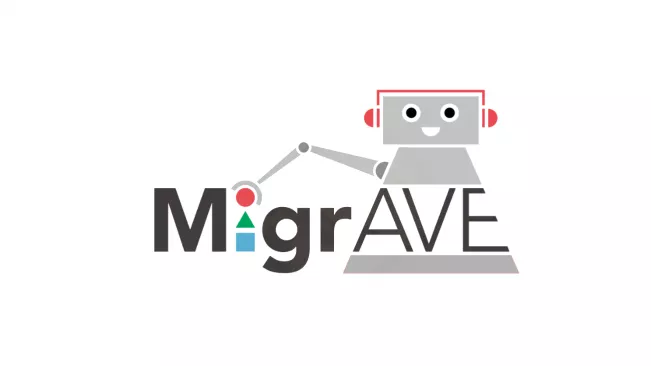Communications and Marketing
H-BRS research team develops learning robots for autistic children

Alex Mitrevski is sitting at a table with a tablet and QT (pronounced Cutie), a robot about 60 centimetres tall, in front of him. "Tap on the cow," says the robot, and photos of various animals appear on the tablet. Mitrevski presses on the correct picture. "Good," says QT, "you get a star for that." As it speaks, the learning assistant's mouth and eyes move, which can be seen on a screen.
Dr Alex Mitrevski is an expert for learning robots at H-BRS. Together with his colleagues, he worked on the programming of the learning robot in the MigrAVE project. The researchers used QT, a robot that was specifically designed for social interactions between humans and machines and is being used and tested in various projects around the world, as a platform.
As shown here in the test, it could be used in future as an aid in learning psychology support programmes for children with autism spectrum disorder (ASD). The robot not only knows the correct answers to all the questions in the learning programmes, but can also use the built-in camera to track whether the child remains attentive. "QT recognises whether the test subject looks away or suddenly stands up. In this case, the robot tries to motivate the other person to continue by speaking to them in a child-friendly way," explains Alexander Mitrevski. To ensure that the robot interprets the children's signals correctly, researchers at the Rheinische Fachhochschule Köln have developed a tool that uses artificial intelligence to recognise whether the children are engaged or distracted, taking into account features such as head position, direction of gaze and other facial characteristics.
Children with ASD need learning support from an early age. According to the researchers' findings, special support programmes should begin before the age of four in order to make the best possible use of developmental potential and achieve the best possible therapeutic success. The team led by project manager Professor Hanns Rüdiger Röttgers, himself a psychiatrist and psychotherapist, from Münster University of Applied Sciences has many years of scientific expertise in autism therapy. In the MIA model project, the Münster intensive programme for children with ASD, the researchers have been working with children of pre-school and primary school age since 2010.
Everyday exercises are particularly helpful
According to the researchers, exercises that are designed to be close to children's everyday lives are particularly effective. This is why the learning robot is not only interested in the names of animals, but can also carry out programmes for washing hands or brushing teeth.
Even if robots can never replace a therapist, Röttgers believes their potential is obvious. "Building up new skills is very time-consuming and sometimes requires countless repetitions, for example when developing language," he says. On the one hand, there is a lack of trained specialists for this, but on the other hand, a robot has the advantage that it always remains friendly, explains the scientist.
According to the project team, further research and improvements in recognising children's reactions are needed before the learning assistant can be used in practice. After that, however, it would be perfectly conceivable to allow QT to carry out tasks independently with a child after a gradual familiarisation phase. "In our tests, the children reacted very positively to QT. This has shown us that it really can be a positive factor in autism therapy in the future," says Alex Mitrevski.
To provide relatives of those affected with reliable information, learning materials and practical tips and support, the MigrAVE project has also created an online platform that can be accessed at www.migrave.de. Both the website and the learning robot have been developed by the project team in several languages to support families with a migration background.
The team
The interdisciplinary MigrAVE project is a collaboration between FH Münster, Hochschule Bonn-Rhein-Sieg and Rheinische Fachhochschule Köln.
Short video of the project (German)

Press photo for download

Contact

Pascal Schröder
Project management for the further development of the university website
Location
Sankt Augustin
Room
E 241
Address
Grantham-Allee 20
53757, Sankt Augustin
Telephone
+49 2241 865 9969